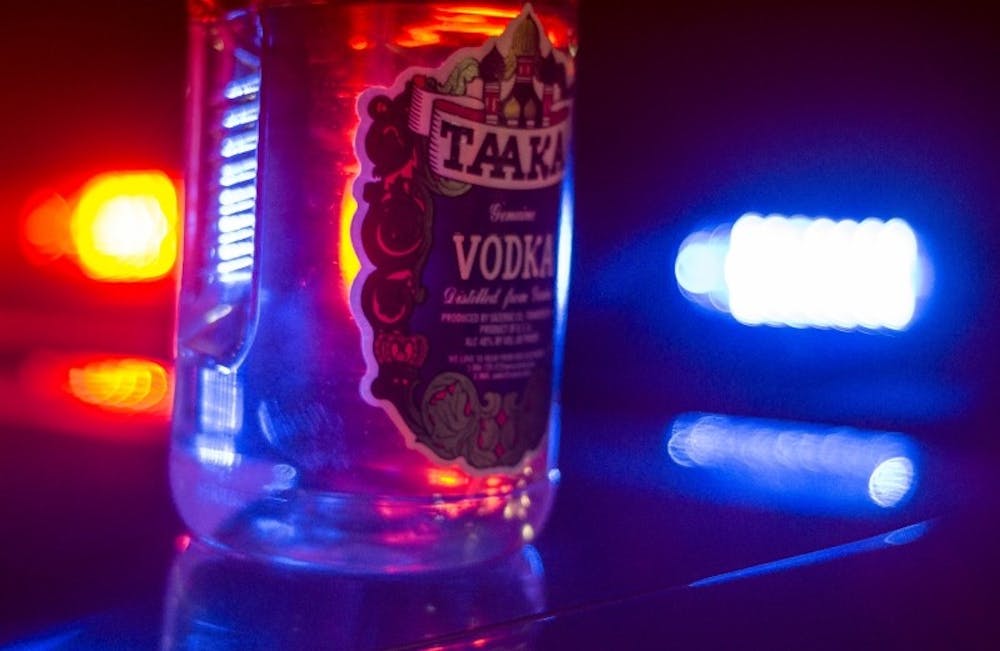Between the years 2014 and 2015, the number of alcohol-related arrests and disciplinary referrals on campus have significantly declined.
According to the 2016 Campus Security Report released Sept. 30, there were 150 on-campus arrests with 531 disciplinary referrals made by the University Police Department in 2014. But in 2015, the numbers dropped to 44 on-campus arrests with 414 disciplinary referrals.
UPD can issue a disciplinary referral instead of an arrest, which results in the student receiving disciplinary action from the university rather than from a prosecutor. This is unlike the options an officer from the Muncie Police Department has. City police can choose only to let the student go or arrest them, said UPD Chief Jim Duckham.
“You know, that’s one of the really nice things about being a campus police officer,” Duckham said. “I have the ability to say, 'maybe this person has a problem with alcohol' and maybe make a referral to the counseling center.”
Although Duckham said there are some online programs that students found to be in violation of alcohol policies may be required to complete, one online program, Think About It, is required for all Ball State students when they first come to the university. Part of the program trains students on the proper ways to measure drink sizes and how to respond to party situations, including proper ways to handle other students passing out from alcohol abuse.
The program is developed by Ball State as another initiative to prevent students from making unhealthy decisions when in an environment with alcohol.
“It is hard to quantify if the programs have a direct effect on policy violations. I am sure as a result of these programs, some students will modify their behavior while others will become more aware of resources available to assist them with alcohol-related issues," Duckham said. "I strongly believe the university’s educational programs have a positive impact on behavior. The programs start conversations, allow UPD to talk about alcohol-related issues with students, such as Indiana Life Line Law, and probably save lives. It is hard to measure sometimes, but if one student is positively affected, it is worth it."
Duckham also said he believes that his department's ability to chose the outcomes for students caught in violation of policies is making a positive difference.
“I think what we do matters and it impacts — and again, it comes back to community policing and engaging with the community and the options to do referrals as opposed to arresting people, and if a student thinks that, you know, they’ll have that option to refer somebody and their friend won’t get arrested,” Duckham said. "I think those things all intervene."
Duckham added that the university still enforces the laws of the state of Indiana, and the use of alcohol is prohibited in residence halls that are not age-restricted to those over the age of 21. Underage students caught with alcohol demonstrating reckless behavior, needing medical attention, damaging school property,operating a motorized vehicle, negatively impacting the learning environment or any incident involving a serious violation will also result in the university notifying the parents or guardians of the student, according to the university alcohol policy.
Although officers with MPD are typically only involved in student alcohol violations off campus, MPD commander Brandon Thomas said city police have also been arresting less students for alcohol violations. Since Aug. 1, Muncie officers have made 107 arrests for illegal consumption or possession of an alcoholic beverage, Thomas said. During the same period in 2015, the number of arrests was 127, and in 2014, there were 183.
The increase in MPD's patrol near the Ball State campus, Thomas said, has most likely decreased the behavior that usually draws the attention of officers while they are on duty. As a result, this has led to a decrease in arrests, he said.
“I have assigned officers to work the areas surrounding the campus of Ball State University every weekend since the week before classes started,” Thomas said. "I think we're seeing those results."
Regardless of the outcomes for students during alcohol violations, however, both Duckham and Thomas said that Indiana’s Lifeline Law — which offers immunity for those calling 911 for help, regardless if underage drinking has been involved — is something students should not hesitate to use in emergency situations.
“You know, the worst scenario [is] the person gets a citation or an arrest. Let’s say, from a sanction," Duckham said. "But if you don’t call, and they’re impaired so badly by alcohol and they die — that's not what we want to see at all. We talk about that — it's important to us."
During any situation in which a student is in distress because of alcohol, Duckham said university police encourage students to call 911, whether the incident is occurring on or off campus.


